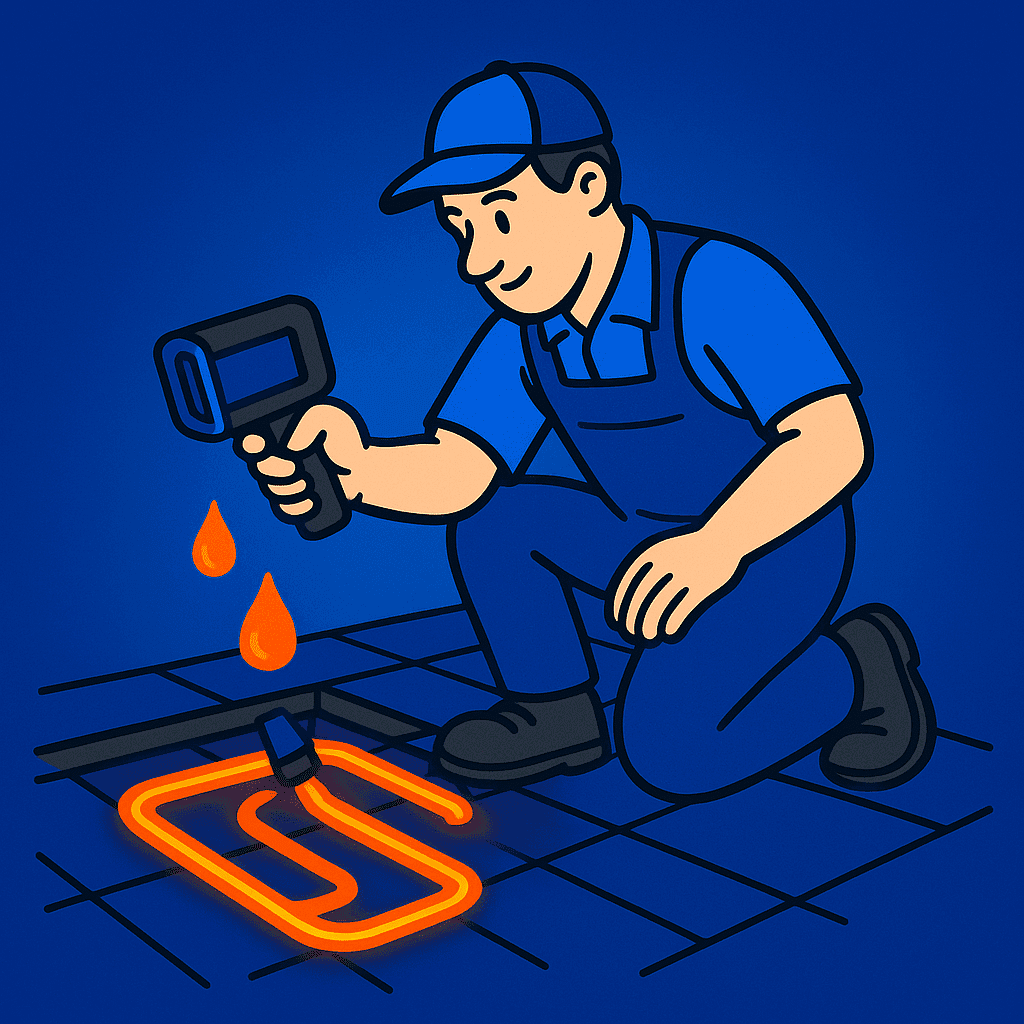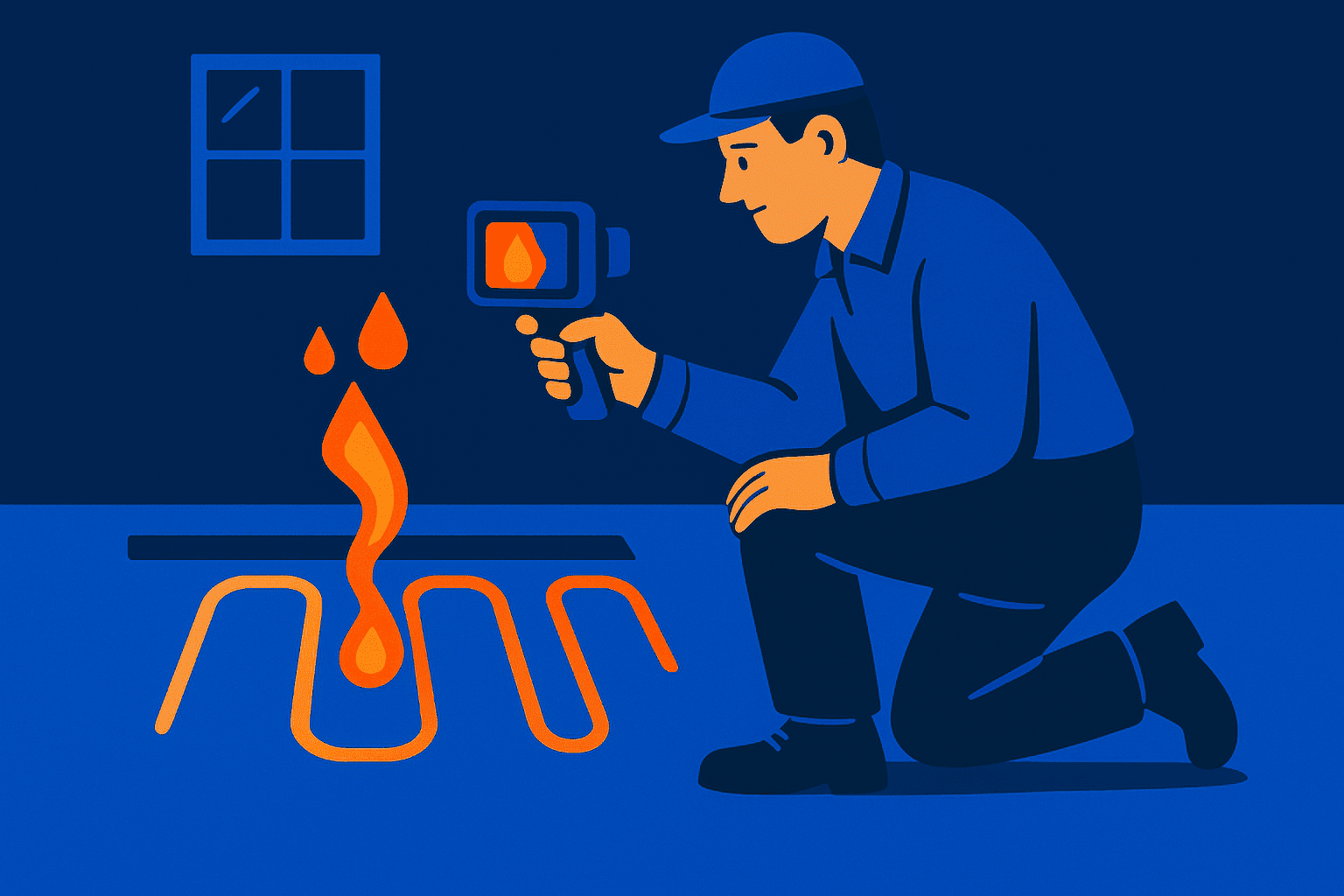Underfloor Heating Leak Detection
Underfloor Heating Leak Detection in Cornwall and Devon. Reliable leak detection and repair 🤝
Get Underfloor Heating Leak Detection
Fast Reply Within 2 – 20 mins 🚀
↓ START THE PROCESS NOW ↓
🔍 Quick Self-Assessment: Do You Have an Underfloor Heating Leak?
 Before you call, check these warning signs. In my 30+ years tracing leaks across Cornwall and Devon, I've seen the same patterns time and again. Here's how to spot trouble early:
Before you call, check these warning signs. In my 30+ years tracing leaks across Cornwall and Devon, I've seen the same patterns time and again. Here's how to spot trouble early:🚨 Immediate Action Needed If You Notice:
- Pressure drop on your boiler gauge - the most reliable indicator
- Wet or damp patches appearing on floors, especially after the heating's been on
- Cold spots in areas that should be warm
- Musty smells or visible mould growth
- Unusual noises - gurgling, hissing, or bubbling sounds
- Higher water bills without increased usage
🔧 Why Underfloor Heating Systems Leak
 After three decades with my ear to the ground (literally), I've traced thousands of heating leaks. Here's what really causes them, not the waffle you'll read elsewhere:
After three decades with my ear to the ground (literally), I've traced thousands of heating leaks. Here's what really causes them, not the waffle you'll read elsewhere:The Big Three Culprits
1970s-80s Copper Nightmare
The chemistry doesn't lie: Thin copper pipes laid directly in concrete react with alkali, creating pinhole leaks. I see this weekly in older Cornwall properties. One leak usually means more are coming.Poor Installation Joints
The truth about fittings: Every joint is a potential failure point. Modern systems use continuous PEX loops up to 110 metres - far fewer joints, far fewer problems.Accidental Damage
The renovation risk: Drill hits, screw punctures, and renovation work account for 30% of the emergency calls I get. Always check pipe routes before any work.The Cornwall Weather Factor
Our coastal climate brings unique challenges. Freeze-thaw cycles stress pipes differently than inland areas. High humidity from sea air can mask early leak signs. I've learned to read our local conditions - it's why central heating leak detection in Cornwall requires local expertise. From professional leak detection specialists in Falmouth dealing with maritime properties to Penzance underfloor heating leak experts handling exposed coastal homes, location knowledge makes the difference. I've traced leaks in Camborne's mining heritage properties and Newquay's holiday accommodation - each area has distinct challenges.🛠️ DCI's 6-Step Underfloor Leak Detection Process
This isn't guesswork. It's a proven system I've refined over decades. Every step builds on the last, getting us closer to your leak with surgical precision:Initial Assessment & System Isolation
First job: establish if it's actually your underfloor heating. I test each zone separately using pressure gauges. Could be water supply pipes, could be drainage. No point chasing the wrong system. This acoustic leak detection methodology prevents wasted time and money.Thermal Imaging Survey
My FLIR camera sees what eyes can't - temperature differences that reveal pipe routes and leak locations. Hot spots show where heated water is escaping into surrounding areas. This thermal imaging leak detection technology is game-changing for underfloor heating systems.Acoustic Detection
High-frequency microphones pick up the sound of water escaping under pressure. Different pipe materials, different frequencies. After 30+ years, I can hear a pinhole leak through concrete. This method works brilliantly for underground water leak detection in all floor types.Tracer Gas Investigation
When thermal and acoustic aren't enough, I inject harmless hydrogen-nitrogen gas. It escapes through any opening and gets detected at surface level - works through wood, tile, even thick concrete. This tracer gas leak detection pinpoints leaks to within centimetres.Precise Location & Access
Now I know exactly where to dig. Trace and access done right means minimal floor damage. I mark the spot, explain what's needed, then make the smallest opening possible. This approach satisfies insurance requirements perfectly.Repair & System Test
Leak fixed, system pressure-tested, everything back to full working order. I use manufacturer-approved repair methods to protect your warranty. Then we test the whole system - no comeback surprises. Full plumbing leak services from detection to completion.💧 DCI Difference: Water Conservation Focus
Every hidden leak wastes thousands of litres. In drought-conscious Cornwall, that matters. I'm not just fixing your heating - I'm stopping unnecessary water waste. It's about doing right by our community and environment.💰 Underfloor Heating Leak Detection Costs
Straight talk on pricing. Unlike the "from £X" nonsense you see elsewhere, here are the real factors that affect your bill:Property Size & Access
Bungalow with easy manifold access? Straightforward. Three-storey house with buried manifold? More complex. Size and accessibility directly impact time needed.System Type & Age
Modern PEX systems with clear documentation? Quick to trace. 1980s copper with no plans? Needs more detective work. Age and documentation matter.Floor Type & Thickness
Tiles over screed need different techniques than engineered wood. Thick concrete takes longer to scan. Floor construction affects methodology and time.Leak Complexity
Single leak in accessible area? Quick fix. Multiple leaks or deep burial? More involved. Complexity affects both detection time and repair scope.Insurance & Trace and Access Coverage
Good news: Most home insurance includes trace and access cover for underfloor heating leaks. This typically covers both my detection fees and necessary access work. Always check your policy first - I provide full documentation for claims. I work directly with most major insurers. No upfront payment if your policy covers it - I claim directly, you get the repair without financial stress.🏠 Water vs Electric: Different Systems, Different Problems
Not all underfloor heating is the same. Here's what I deal with across Cornwall and Devon:Wet (Hydronic) Systems
What leaks: Water-filled pipes, manifold connections, pump units Detection methods: Pressure testing, thermal imaging, tracer gas Common in: New builds, extensions, whole-house heatingElectric Systems
What fails: Cable damage, joint failures, control systems Detection methods: Thermal imaging, electrical fault finding Common in: Bathrooms, conservatories, retrofit installations🛡️ Preventing Future Underfloor Heating Leaks
Prevention beats cure, every time. Here's my maintenance programme - based on real-world experience, not marketing fluff:Annual Maintenance Schedule
September (Pre-Winter)
- Pressure test all zones
- Check manifold connections
- Bleed air from system
- Test controls and thermostats
December (Mid-Season)
- Monitor pressure gauges weekly
- Check for uneven heating
- Listen for unusual noises
- Inspect visible pipework
March (Post-Winter)
- System shutdown checks
- Inhibitor level testing
- Full pressure test
- Documentation update
Ongoing (Year-Round)
- Never exceed recommended pressure
- Check pipe routes before drilling
- Report any pressure drops immediately
- Keep system documentation accessible
🔧 DCI Maintenance Visits
I offer annual preventative checks for underfloor heating systems across Cornwall and Devon. Better to catch problems early than deal with emergency leaks. Includes full system pressure test, thermal scan, and maintenance report. This comprehensive approach prevents the need for emergency slab leak detection and costly swimming pool leak detection in properties with complex heating systems.📍 Cornwall & Devon Service Areas
I know our local building styles, pipe materials, and common problem areas. Here's where I provide rapid services for people to get advice when you think you have an underfloor leak:🏴 Cornwall Coverage
Primary areas: St Austell underfloor heating leak detection, Truro heating system leak experts, Saltash leak detection specialists, Bodmin emergency leak detection, Redruth underfloor heating experts, and St Ives leak detection services🌊 Devon Coverage
Primary areas: Exeter underfloor heating leak detection, Torquay heating leak specialists, Paignton leak detection experts, Barnstaple underfloor heating services, Tiverton leak detection specialists, Newton Abbot heating leak experts, Exmouth emergency leak detection, Bideford underfloor heating services, Sidmouth leak detection specialists, and Tavistock heating system leak experts🚨 Emergency Response: What to Do Right Now
Found a leak? Here's your immediate action plan - learned from 30+ years of emergency callouts:Step 1: Stop the Water Flow
Turn off your underfloor heating system immediately. Close the flow and return valves on your manifold if you can access them safely. Don't know where they are? Turn off your boiler instead.Step 2: Document Everything
Take photos before cleaning up. Your insurance will need evidence. Note the exact time you discovered the leak and any changes in your boiler pressure gauge.Step 3: Call DCI Immediately
07822 025 911 -. The sooner I locate and stop the leak, the less damage to your property and the environment.✅ Why Choose DCI for Underfloor Heating Leak Detection
Three Decades of Experience
Started as a plumbing apprentice in 1985, evolved with leak detection technology. I've traced leaks through every type of system, floor, and building method used in Cornwall.Latest Detection Technology
Professional thermal imaging, acoustic listening equipment, and tracer gas systems. I invest in technology that gets results, not gadgets that look impressive.Insurance Industry Approved
Work directly with major insurers, providing compliant trace and access reports. Fully insured, certified, and transparent about all costs.Local Cornwall Knowledge
Based in Saltash, I understand local building methods, materials, and access challenges. No learning curve - I get straight to work solving your problem.🏆 Professional Accreditations
Ready to Find Your Underfloor Heating Leak?
Don't let a hidden leak damage your home and waste precious water. Get Cornwall's most experienced leak detection engineer on your case.📞 Call Direct
07822 025 911Dive straight in📍 Location
Saltash, CornwallCovering Cornwall & DevonFrequently Asked Questions Underfloor Heating Leaks
How long does underfloor heating leak detection take in Cornwall?
Most jobs take 2-6 hours depending on system complexity and property size. My 30+ years of experience means I can often locate leaks faster than competitors who quote 4-8 hours. Complex 1980s copper in concrete? Half a day maximum. Cornwall’s older properties often need more detective work due to poor original documentation.
What happens if you find multiple leaks in my underfloor heating?
Common in 1970s-80s Cornwall properties with copper pipes in concrete. I prioritise repairs by severity: major leaks stopped immediately, minor ones assessed for cost-effectiveness. Sometimes replacing entire zones is cheaper than multiple small repairs. I provide a comprehensive report showing all leak locations, repair options, and cost comparisons. Most insurers cover multiple leaks under single claims when properly documented.
Why do 1970s-80s Cornwall properties have more underfloor heating leaks?
Chemistry doesn’t lie. Thin copper pipes laid directly in concrete react with alkali, creating pinhole leaks. This was common practice in Cornwall developments between 1975-1985. One leak usually means more are coming. I’ve tracked this pattern across hundreds of jobs. Modern systems use PEX pipes with protective barriers – completely different chemistry, far fewer problems.
What's the difference between wet and electric underfloor heating leak detection?
Huge difference. Wet systems: pressure testing, thermal imaging, tracer gas injection. Electric systems: thermal scanning, electrical fault finding, cable continuity testing. Wrong diagnosis wastes hours and money. I identify your system type within minutes – competitors often guess. Wet systems show temperature drops, electric systems show heating element failures. Completely different approaches needed.
Should I call emergency or standard service for underfloor heating leaks?
Emergency (same-day): visible water damage, complete system failure, significant pressure drops, property flooding risk. Standard (next-day): suspected leaks, gradual pressure loss, uneven heating, preventative checks. Emergency callouts cost 50% more but prevent major damage. I’ve seen £500 leaks become £5,000 problems when ignored overnight.
How do you detect leaks under thick concrete floors in Cornwall and Devon?
Critical factor competitors ignore. Pre-1980: mostly copper pipes, often unlagged, expect multiple leaks. 1980-2000: mix of copper and early plastic, better documentation. Post-2000: modern PEX systems, detailed plans available. I adjust detection methods based on building era. Victorian conversions need special care – I know which Cornwall builders cut corners and which built to last.
What environmental impact do underfloor heating leaks have?
Hidden leaks waste 50-200 litres daily. In drought-conscious Cornwall, that’s environmentally irresponsible. I’m not just fixing your heating – I’m stopping unnecessary water waste. Average hidden leak wastes 15,000 litres yearly. That’s enough water for a family of four for 6 weeks. Every leak I find helps protect Cornwall’s water resources for future generations.
